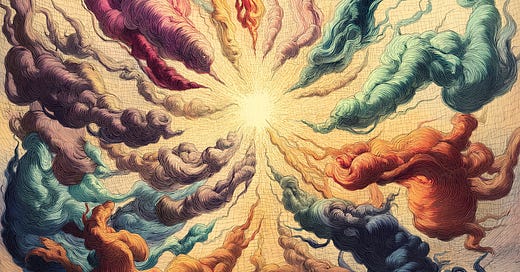At the crossroads of fact and fiction lies belief. Not something so easily discarded as a mere story, but a deeper undercurrent—woven into the very threads of our psyche. It’s an ancient relic, this belief, hovering somewhere between instinct and symbolism. Art grows from this place, rooting itself in both conscious and unconscious gaps, beautiful and festering all at once. It's from these gaps, teeming with contradictions and chaos, that humanity breathes meaning into life. Without meaning, without belief—there’s nothing left but the void. Death might seem a better alternative.
But for too long, belief has been anchored to lies masquerading as truths. Religion, fandom, conspiracy—all dressed up as factual narratives guiding our beliefs. But to what end? Just meaning? No. That’s too narrow a scope for belief's full potential.
Belief is power, political or social, a mechanism for making decisions when reality is too slippery to grasp. It’s what remains when facts falter, when fiction sinks its claws in. Belief is a utility—one we can harness, or one that can crush us. So, what should we believe? Do we let loose facts shape our beliefs, only to find ourselves clutching at subjective interpretations like desperate children deciphering shapes in the clouds?
Does the cloud look like a ship or a truck? It doesn't matter. But we, in our arrogant little minds, cling to these interpretations as if they define us, define the world. The facts are meaningless—the interpretation is arbitrary. Yet we build entire structures of hatred and violence, of love and hope, on these fragile perceptions, as though they’re immutable truths.
In a world that is slipping toward agnosticism and atheism, where these old belief structures crumble, something primal still pulls us toward meaning. Religion once filled that void, organizing our chaos, but now we drift—individuals lost in a sea of disconnected beliefs.
We haven’t descended fully into the madness of cultism yet. Society still balks at the thought of corporations hiring based on belief, but for how long? We are in limbo, waiting. We used to be told what to believe, which leaves to rake into neat piles. Now, we’re left to sort the debris ourselves, and it’s a mess.
And so we cling, stubbornly, to the beliefs that spring from these unreasoned places. The old adage holds true: “You cannot reason people out of positions they didn’t reason themselves into.” Belief defies logic, which is why logic rarely wins the battle for hearts and minds.
We need a new framework, a new filter for belief. One that doesn’t rely on personal biases or arbitrary facts, but on outcomes. Does this belief lead us somewhere useful, somewhere collective? If not, discard it as you would a passing cloud. Was there a second shooter in the Kennedy assassination? Believe what will drive you toward truth and action, not toward some shallow satisfaction of curiosity.
Is the earth flat? If it were, then we’d be living in a world of mass conspiracy, a web of lies spun so tightly we’d have no choice but to tear the system down. But we don’t. The facts—those few that stand up to scrutiny—tell us there’s no reason to believe in a flat earth. It offers no utility.
And what of God? If God exists, then perhaps we are loved, watched over. But if not, we’re left with just each other. And maybe that’s the point—that in the absence of divine guidance, we should turn to one another for the meaning we seek. Without God, we’re forced to make the world a better place ourselves. And so, no. We should not believe in God—not because the idea isn’t beautiful, but because it isn’t useful.




